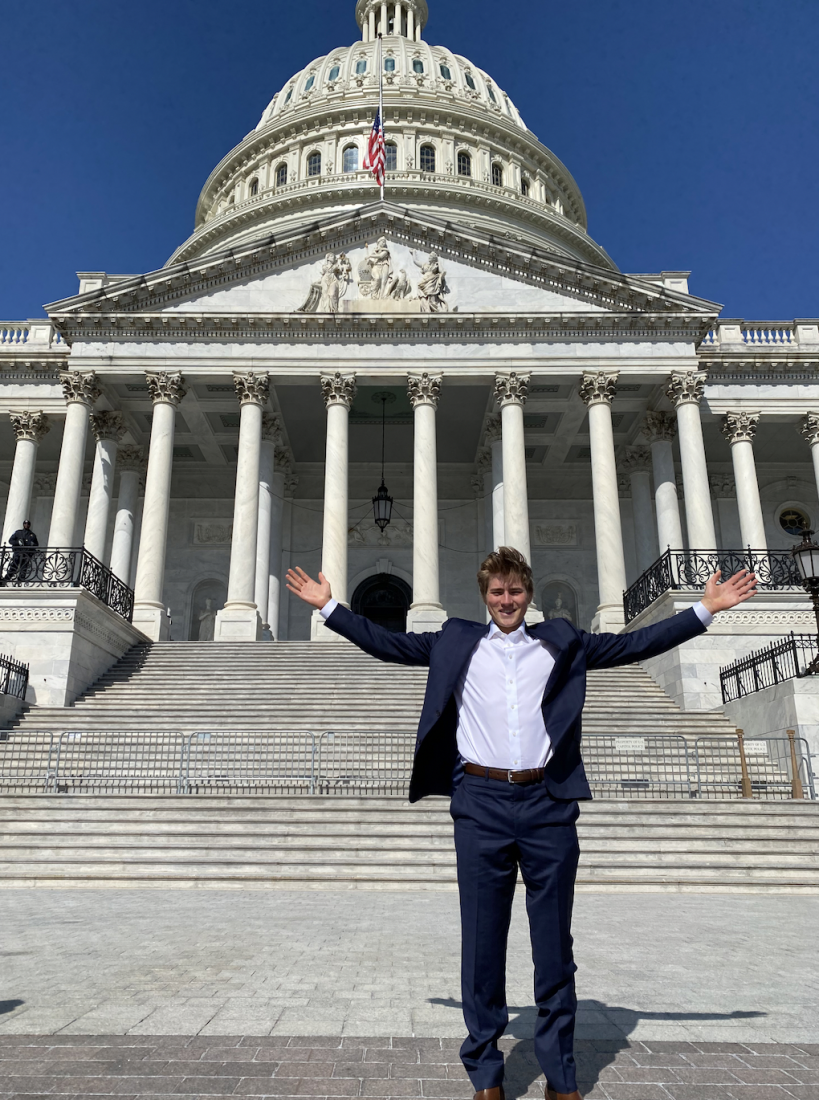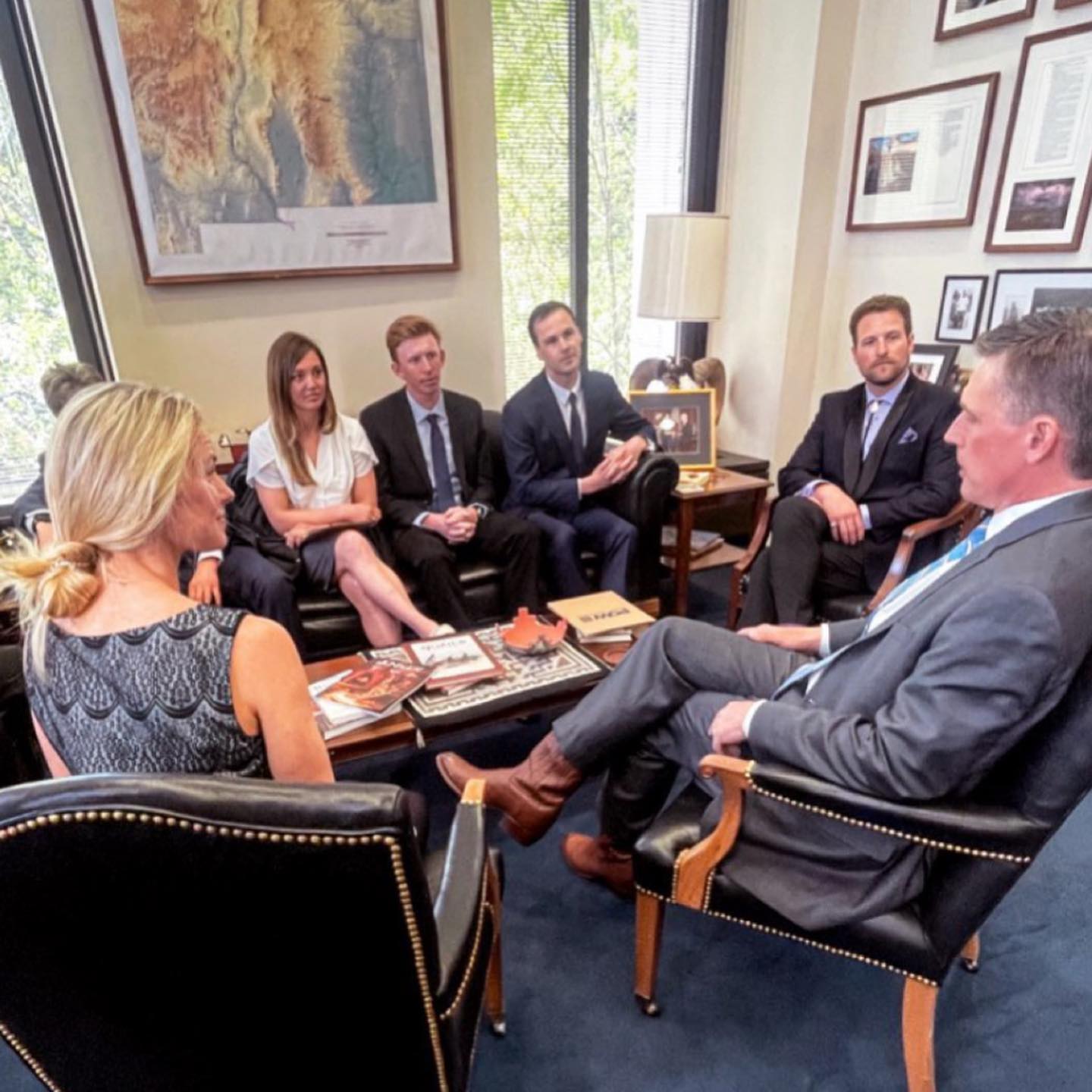
On April 27th, Gus Schumacher and Jessie Diggins headed to Washington, D.C. with six other winter Olympians and Paralympians as members of the Protect Our Winters (POW) athlete alliance to advocate for progressive changes in climate policy. While Diggins has been partnered with POW for several years, Schumacher only recently came on board, making the trip his first experience lobbying for climate activism; it was also his first trip to the nation’s capital.
 While in D.C., the POW team met with members of the conservative climate caucus, led by Utah Congressman John Curtis, to advocate for the support of the following five “asks” in climate package negotiations:
While in D.C., the POW team met with members of the conservative climate caucus, led by Utah Congressman John Curtis, to advocate for the support of the following five “asks” in climate package negotiations:
- Funding programs that focus on reducing emissions, like the Greenhouse Gas Reduction Fund and Climate Pollution Reduction Grants/
- Investment in electric vehicle (EV) infrastructure.
- Upgrade the grid to power a renewable energy future by funding projects that upgrade transmission lines and intertie incentives.
- Assist communities in worker transitions with programs like energy community reinvestment financing.
- Stop drilling in the Arctic, specifically stopping the Willow Project from moving forward in the National Petroleum Reserve Alaska.
Following a dinner with the Republican caucus where athletes shared the ways in which their sports and home communities have been affected by climate change, the group spent the day lobbying in congressional offices, discussing the importance of the asks with senators, congresspeople, and members of their staff.
Not knowing what to expect from his first lobbying experience, Schumacher noted he was happy to hear the agreement among the Republican and Democratic politicians with whom they spoke surrounding the need to reduce emissions and address the “big problem” of climate change head on.
“To a degree, everyone agrees we should reduce emissions and it’s figuring out how to do it where everyone is in a different place,” Schumacher said in a call. “So I learned a bit about how [different politicians are] approaching it, and how people generally care [about the issues], but I think it’s just hard for a lot of people to agree on a methodology.”

The conversation most engaging for Schumacher personally took place with Alaskan Senator Lisa Murkowski. In addition to discussing topics that were close to home, the conversation felt significant in that Murkowski is “on the fence” when it comes to supporting each of the asks.
Alaska’s economic dependence on oil is juxtaposed with the grave reality that the Arctic is warming at a faster rate than other parts of the world. Murkowski had just returned from a visit to the small city of Kotzebue in rural Northwest Alaska, roughly 30 miles above the Arctic circle. Despite its size and location, the city has adopted infrastructure, specifically wind and solar, that allows it to depend heavily on renewable energy sources when possible.
“They have one solar panel that works on both sides, so [it also captures energy as] the sun reflects off the snow, plus they have a couple of windmills. They were running 80% renewable that week, which is really big for those communities… So that was really cool that she’s at least interested in those kinds of advancements. She also mentioned electrifying our ferry system using hydropower in the area, which seems pretty sweet if you can make it work.”
At the same time, Murkowski recognizes Alaska’s dependence on oil, and therefore was unwilling to support the ask to stop drilling in the Arctic.
“That’s a huge source of income for Alaska and is going to positively impact in the short term Alaskans and rural Alaskan,” said of the complicated issue. “[Because of the impacts of climate change on the Arctic], rural Alaskans need carbon to not be emitted anymore, but they also need to be able to pay for the gas currently to heat their homes and for food that they can’t get from subsistence hunting. So you’re kind of falling on your own sword a little bit, and that’s something that I can appreciate as being a political problem. It’s hard to deal with because you can’t just like immediately switch to renewables – or in the contiguous United States – and then have all these people that don’t have any source of income.”

Settled back in Alaska at the time of the call, Schumacher remained energized by the experience and expressed interest in continuing to participate in climate advocacy in the future.
“The advocacy really was cool because it makes it feel like [my voice has] more power than just voting, which is cool. And it’s exciting to realize that by skiing, I’ve gotten myself to that position. And yeah, I’m really proud of it and excited and hopeful to do some more and hopefully those asks can change and get stronger and stronger.”
Schumacher also enjoyed the opportunity to engage with the other members of POW’s athlete alliance and to learn more about the various experiences that led them to engage with climate advocacy.
“It was cool to hear everyone’s story and hear that they care about climate change, but come at it from a different way. Like [Olympic halfpipe skier] David Wise in Nevada where, obviously, it looks a lot different [than Alaska], but he has a creek that dries up near his house and he’s a farmer… so that was [interesting] to hear about. The POW organizers were really dialed and made it easy for us. Just getting involved with the whole scene of lobbying was eye opening. Definitely like nothing I could have learned from middle school history. I sort of knew how it all worked, but being able to actually go inside of those offices and just see the whole lobbying system was really neat.”
Schumacher’s interest in these topics extends beyond his partnership with POW into his academic studies. In choosing to major in civil engineering, Schumacher was interested in furthering technological innovation to support a more sustainable future.
“Especially civil engineering, which deals with large scale infrastructure – the more that can be dialed in and efficient, I think that’s a big source of moving towards the future of how we function as a society.”
While there is plenty of action needed to make significant progress in fighting climate change, Schumacher expressed that he left the experience feeling optimistic.
“Some people, I’m sure, will say that it’s naive. They’re politicians and they want to make you happy and, obviously, we come in with a big sign that says ‘we care about climate’, so know what to say to make us happy… but the Democratic members were leaning far forward on climate protection, which I was a little surprised with… And then the Republican senators that were plainly like, ‘Yeah, we need to reduce emissions and we didn’t need to do it quickly…’ And I think maybe they want to do it more in a natural gas route, which seems like a step to the side. But to at least have people saying, ‘yeah, we need to do this quickly,’ hopefully, that can be converted to action.”
He continued that he believed that the representatives with whom POW spoke genuinely listened to what they had to say, and expressed belief that the more individuals and groups who lean on those politicians to make those changes, the more likely they will be to take action.
“The message here would be to call your representatives and because I think they do listen to that. These offices aren’t that big, so if they get a ton of calls about updating the electric grid and developing renewable energy, I think that’s going to have some weight.”

Recognizing that it can be challenging to stay informed when a new bill is on the table, which may be an impactful time to call, Schumacher recommended following the news tab on the Protect Our Winters website or through their social media platforms.
Schumacher concluded by emphasizing the collective power that individuals in the “Outdoor State”, which includes the cross-country ski community, have in advocating for change. According to POW, outdoor recreation unifies 50 million people across the US, resulting in an nearly $670 billion dollar industry.
“That’s bigger than pharmaceuticals and oil and gas combined, which I don’t think people necessarily realize. And I think part of it is that’s a group that has a lot of little voices, generally, but it’s a powerful group and it’s bipartisan – POW itself is represented by roughly 40% Democrat, 30% Republican and 30% Independent. So it’s something that everyone cares about, and I think that’s a confidence boost.”
Rachel Perkins
Rachel is an endurance sport enthusiast based in the Roaring Fork Valley of Colorado. You can find her cruising around on skinny skis, running in the mountains with her pup, or chasing her toddler (born Oct. 2018). Instagram: @bachrunner4646



